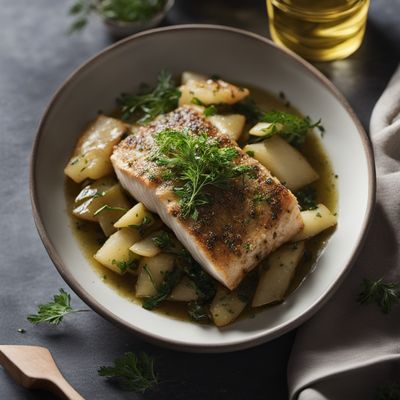
Cuisine
Epirotic cuisine
Epirotic cuisine is based on the Mediterranean diet, which emphasizes the consumption of fruits, vegetables, whole grains, legumes, and olive oil. The cuisine is characterized by its use of fresh herbs and spices, such as oregano, thyme, and rosemary, as well as local cheeses, such as feta and graviera. Meat dishes are also a staple of Epirotic cuisine, particularly lamb and goat. The cuisine is known for its hearty, flavorful dishes.
Typical ingredients
Olive oil, Feta cheese, Graviera cheese, Honey, Herbs (oregano, thyme, rosemary), Meat (lamb, goat), Vegetables (tomatoes, eggplant, zucchini, peppers), Legumes (chickpeas, lentils), Grains (barley, wheat)
Presentation and garnishing
Epirotic cuisine is often presented in a rustic, simple manner, with dishes served family-style. Garnishes may include fresh herbs, lemon wedges, and drizzles of olive oil. Some dishes, such as moussaka and pastitsio (a baked pasta dish), may be topped with a creamy bechamel sauce.
The region of Epirus is known for its stunning natural beauty, including the Vikos Gorge, one of the deepest gorges in the world. The region is also home to several important historical and cultural sites, including the ancient city of Dodona and the monasteries of Meteora.
More cuisines from this region...
Cretan cuisine, Macedonian cuisine (Greek), Cuisine of the Ionian Islands
History
Epirotic cuisine has a long history, dating back to ancient times. The region has been inhabited since the Neolithic era, and its cuisine has been influenced by various cultures throughout history, including the Greeks, Romans, and Ottomans. The cuisine has also been shaped by the region's geography, as the mountainous terrain has made it difficult to cultivate crops and raise livestock. As a result, the cuisine has traditionally relied on hearty, flavorful dishes that make use of local ingredients.
Cultural significance
Epirotic cuisine is an important part of the region's culture and heritage. It is known for its simplicity and use of fresh, local ingredients. The cuisine is also closely tied to the region's history, as it has been shaped by various cultures throughout the centuries. Epirotic cuisine is also known for its health benefits, as it is based on the Mediterranean diet, which has been shown to reduce the risk of heart disease, stroke, and other chronic illnesses.
Health benefits and considerations
Epirotic cuisine is known for its health benefits, as it is based on the Mediterranean diet, which has been shown to reduce the risk of heart disease, stroke, and other chronic illnesses. The cuisine is low in saturated fat and high in antioxidants, thanks to its emphasis on fresh fruits, vegetables, whole grains, and olive oil. However, some traditional dishes may be high in sodium, so it is important to consume them in moderation.
Epirotic cuisine recipes Browse all »

Epirotic-style Linguine Rice
Savory Linguine Rice with a Greek Twist

Epirotic Mućkalica - A Hearty Delight from Epirus
Savor the Flavors of Epirus with Epirotic Mućkalica

Epirotic Almond Cookies
Deliciously Nutty Epirotic Almond Cookies

Epirotic Fajitas
Sizzling Epirotic Fajitas: A Greek Twist on a Mexican Classic

Epirotic Apple Pie
Mountain Delight: Epirotic Apple Pie

Epirotic-style Cod Açorda
Savory Epirotic Cod Bread Soup

Epirotic-style Meatballs in Tomato Sauce
Savor the Flavors of Epirus with These Tomato-Braised Meatballs

Epirotic-style Num Banh Chok
Savor the Flavors of Epirus with Epirotic-style Num Banh Chok

Epirotic-style Stuffed Squid
Squid Delight: Epirotic Stuffed Calamari

Epirotic Lamb Skewers with Herb Marinade
Flavorful Epirotic Lamb Skewers: A Taste of Greece

Epirotic Drunken Pie
Tipsy Delight: Epirotic Drunken Pie

Epirotic Sfinci di San Giuseppe
Fluffy Epirotic Cream Puffs